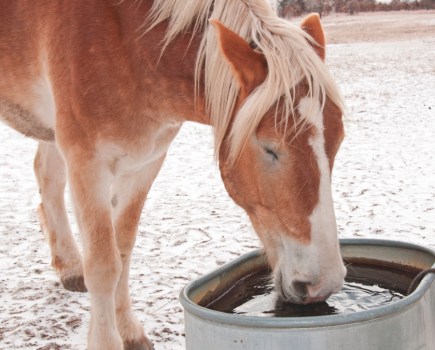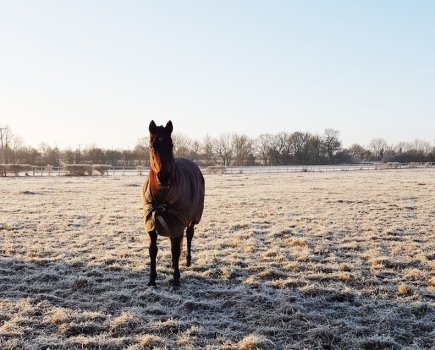If your horse suddenly becomes seriously unwell, goes lame or is badly injured, do you have the funds needed to aid their recovery or would you need the help of a horse health insurance policy that includes vet fees cover?
Any equine can suddenly fall ill with colic, get kicked in the field or be diagnosed with a serious health issue like gastric ulcers — and it often happens when you least expect it and your bank account is running on empty.
Research shows that a whopping 80% of people are worried about increasing costs of owning a horse, and it’s often when finances are tight that we question whether we need to be paying for an insurance policy that we haven’t yet needed to use.
According to Liz Hopper, managing director at Harry Hall, some horse owners are choosing to move away from fully comprehensive insurance policies (which includes cover for health problems/vet fees) or not have any insurance in place at all in order to save money.
“Although this may provide short-term relief, the long-term financial consequences could be significant,” says Liz. “In case of an emergency [vet] visit outside of regular working hours, the cost alone can range between £200-£300. If your horse needs surgery for a condition like colic, the minimum cost could be as high as £5,000.”
A recent claim from a Harry Hall One Club member after their horse was injured while riding and cut its knees totalled £3,000 for vet fees.
“The average cost for vet fee insurance is around £25 a month, a significantly low cost compared to vet fees and other care-related costs,” adds Liz.
Top causes of horse health insurance claims
Leg conditions were the most claimed for ailment in 2023 for The Insurance Emporium customers, with the average cost of each claim being £733. Meanwhile, colic was the cause of their highest average pay outs at £1,081.
Claims for other digestive system conditions like gastric ulcers averaged £908.
Gastric ulcers was the leading cause for horse health insurance claims by SEIB Insurance Brokers’s customers. Ulcers accounts for 71% of claims and more than half of these were for over £3,000.
This is a rise of £700 compared to 2022, when the cost of gastric ulcers claims averaged £2,459 and accounted for slightly fewer claims (59%).
Colic also triggered a high number of claims by SEIB customers in 2023, as did horses who had suffered an external injury as a result of an accident or trauma, such as a fall, kick or cut.
The average cost of these claims was just over £1,100 and 50% occurred while the horse was stabled or turned out, rather than being ridden.
More causes of insurance claims
SEIB’s report for 2023 also shows that claims for degenerative disease and development disorder averaged £2,232 last year, with both forelimbs being the most common cause and accounting for over a quarter of claims.
Pay outs for other lameness averaged £2,474. Of these claims, 24% were caused by disease or injury, while problems with tendons and ligaments in one or both hindlegs triggered 16% of claims.
Vets fees for teeth, gums and jaw disease was the sixth most claimed for, while a high number of claims for spavin and kissing spines means these conditions also appear in SEIB’s top 10 reasons for horse health insurance claims last year.
Going back a few years, the most claimed-for condition in 2018 by Petplan Equine policyholders was also gastric ulcers. The total amount of claims it paid out for veterinary fees in that year came to over £1 million.
At KBIS, 53% of veterinary fees claims between 2016 and 2018 were related to lameness in horses, and one in four holders of its leisure and competition policies made a claim.
Do you need horse health insurance?
I have had some of my horses insured in the past, but not all of them. It’s a topic that people feel strongly about, and what one person thinks won’t suit another. However, in my experience it’s usually when you can afford it least that your horse injures themselves or becomes ill, prompting an eye-watering veterinary bill to land in your inbox a few days later.
Even if you’ve saved money to pay vets bills instead of having horse health insurance cover, you may find yourself having to choose between different treatment options on your affordability. And once your pot of money has been used, what happens if your horse requires urgent veterinary treatment before you have replenished said funds?
“I know some owners set aside money to pay for veterinary bills — often the same amount each month that an insurance premium would cost,” says equine solicitor Rebecca Stojack, senior associate at law firm Geldards.
“This may seem a safe option, but it might only take one claim to wipe out your savings. Then, if your horse needs more treatment a short time later, you risk not having enough to fund their care. You should only forgo insurance if you can be sure that you can afford anything that comes your way.”
Where to buy horse health insurance
Here is a handy list of horse insurance companies:
- SEIB Insurance Brokers — Horse Insurance Options
- Petplan Equine — Get a Quote
- Agria — Get a Quote
- KBIS — Get a Quote
- Shearwater Insurance — Equestrian Insurance Options
- NFU Mutal — Equine Insurance Options
- The Insurance Emporium — Build Your Own Horse or Pony Insurance Policy
- Horse Insurance — Get a Quote
- Harry Hall One Club members can opt in for Horse Vet Fees Insurance
- World Horse Welfare offers its members’ horses Accidental External Injury Insurance.
Agria’s equine lifetime insurance policy was the first of its kind when it was launched in the UK in September 2022, providing cover for vet fees up to £10,000 every year. Only issues/injuries that occur before the insurance policy is taken out are excluded and no exclusions are added after a claim is made, providing the policy is not cancelled or cover does not lapse.
What is covered?
Most horse health insurance policies will cover non-routine veterinary fees to a set amount. This amount will differ from provider to provider so check.
You can’t claim for routine treatments such as vaccinations, annual boosters or worming, but treatments that complement veterinary intervention, such as physiotherapy, remedial shoeing and acupuncture (provided they’re recommended by your vet as part of the claim), may be covered. Check the policy as this can depend on what level of cover you have.
Alternative therapies, such as herbal treatments, are unlikely to be claimable. Some polices include hospitalisation fees and transport to and from the vets too. Check the small print.
Any pre-existing conditions your horse may have will not be covered and it’s vital to inform your provider about these when taking out insurance. Don’t delay this.
With most policies, you have 12 months from the incident happening to the claim ending, or up to the list of the vet fee cover — whichever comes first. KBIS offers 15 months from the incident happening to the claim ending.
“Horse owners often see vet fees as the most important part of insurance, as cover for the cost of diagnosis and treatment is a priority,” says a spokesperson for Petplan Equine.
“It’s worth checking the exact cover you get under your policy. Some policies with other insurers will have additional limits with the veterinary fees benefits for things such as diagnostic investigation, and may even exclude cover for some conditions.”
What are the limits of veterinary fees cover?
There are two options here, so ask which your horse health insurance provider offers.
Option one
The first option provides cover for treatment up to the full veterinary fee limit you choose, with no additional hidden limits for each condition, so you can claim for as many different incidents as you need to. This is the ideal situation for most horse owners.
Option two
The second option, which is generally less popular with horse owners, is when the fee limit is per 12 months, not per incident. With this cover, if the limit for vet fees is £5,000, that’s the maximum that can be paid out over the whole year, so if your horse’s vet bills exceed this amount, you may find that you have to fund some of the vet fees yourself.
Vettings
If you bought your horse for less than £6,000, a vetting isn’t mandatory in order to take out a horse health insurance policy. For any horse purchased for more than £6,000, a minimum of a passed two-stage vetting is required.
“It is worth noting that with a horse of any value, if you have had them vetted for purchase and they passed, if you insure them within seven days of purchase and the vetting is no more than 14 days old when the policy is taken out, the horse will receive the full cover you have chosen straight away,” explains Mike King, equine team manager at KBIS.
“Without a vetting, or if this timeframe isn’t met for any reason, the first 45 days of cover are limited to accidental, external injuries involving an open wound only. After this, the full cover is in place.”
For any horse health insurance policy that also includes cover for loss of use, a passed five-stage vetting is required within 14 days of the start date of cover, regardless of purchase price or how long you have owned the horse.
What is catastrophe cover?
Some insurance companies offer catastrophe-only cover, but not all. It is a budget policy, which is an alternative to traditional horse insurance and is limited to claims for certain types of vets’ fees only.
“Our catastrophe cover covers your horse for accidental external injury (a cut on their leg, for instance), plus three life-saving procedures,” explains KBIS.
“These are joint of tendon sheath flushing as a result of sepsis, colic surgery and surgery for pastern and pedal bone fractures.”
Usually only the surgery costs will be covered, and not hospitalisation or diagnostic fees.
Horse health insurance for veterans
Some insurance companies stop providing full vet fees cover to horses when they reach a certain age, often 16 or 17, when veteran cover starts and the horse is only covered for external injuries.
Some providers, including Petplan Equine and KBIS, insure horses for illness and injury up to the age of 25. With Agria’s lifetime cover, it is possible to insure a horse with full vets’ fees cover from the age of 30 days old until the day it days, no matter its age.
Some horse owners take a risk by insuring their horse for a lower value that they are worth in order to keep insurance premiums lower, but still have vets’ fee covered.
Be very careful with this, though, as setting a horse’s value too low could mean you have restrictions imposed and, if the worst happens, you won’t receive their full worth.
Horse health insurance: do you really need it?
I have owned a lot of horses, only a few of whom have been insured. The majority have not been because I confess that I have questioned the cost of having a policy in place, especially when I own several horses.
However, I would not have been able to afford to take my ex-racehorse King Muro to the Royal Veterinary College for an MRI scan without his insurance cover from Petplan Equine, who very quickly approved his referral (within 24 hours). Without that scan, we would never have truly known what was going on inside King’s hooves.
Similarly, when my sister’s Thoroughbred Classic Action stood on himself while cross-country schooling and punctured his fetlock joint with a dirty stud, it was reassuring to know that he could be boxed up and taken straight to the nearest equine hospital.
There he received a joint flush and the necessary treatment to make a full recovery, and NFU Mutual settled the bill quickly.
When you need it, horse health insurance cover is invaluable and it does mean more diagnostics and treatment options are available.
There have been times when I’ve been forced to choose the more affordable treatment option for an uninsured horse based on my bank balance at the time. Sadly for one mare, that meant saying no to colic surgery and we had to have her put to sleep. That was a very sad day indeed.
Final thoughts
If you’ve had horse health insurance in the past but never made a claim for vet fees, you may be thinking it’s not worth it and all will be fine if you don’t renew — I get it!
It isn’t compulsory of course; it’s down to you as a horse’s owner to decide whether to take it out or not. The obvious risk if you choose to forgo horse health insurance is not being able to pay for any veterinary treatment or diagnostics your horse may need, so write down all the pros and cons on a piece of paper and use that to help you decide.
As an absolute minimum you need to have third party cover and ideally personal accident in place, just in case you and your horse are involved in an incident.
Main image: copyright Shutterstock









